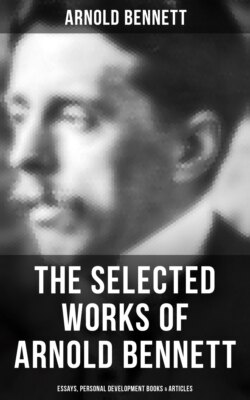Читать книгу The Selected Works of Arnold Bennett: Essays, Personal Development Books & Articles - Arnold Bennett - Страница 76
На сайте Литреса книга снята с продажи.
The Artistic Novel.
ОглавлениеFine taste in fiction is almost as rare among novelists as among the general public. The average novelist is but little more pleased than the average reader with the supreme masterpieces of fiction. The average novelist is decidedly not very interested in the progress of his craft—in questions of technique or the achievements of other novelists. Occasionally, however, one encounters an aspirant who is genuinely enthusiastic for the art of the novel, who dreams of artistic perfection first and of popularity afterwards, and whose curiosity about technique is quenchless. To such a man, in search of ideals, I would say that he will find a refuge from the insularity of English fiction in Russian, French, and Italian fiction. The literature of the novel exists chiefly in France. The beginner with artistic aspirations should read the Journal of the brothers De Goncourt, Guy de Maupassant’s essay on Flaubert, Tolstoi’s essay on De Maupassant, and the critical work of Ste. Beuve, Anatole France, Jules Lemaitre, Paul Bourget, and the Comte de Vogue. In English he should read the letters of R. L. Stevenson, Professor Walter Raleigh’s The English Novel, Professor Saintsbury’s essay on Balzac, and Mr. Edward Garnett’s essays on various novels of Turgenev. He will find in these various works an attitude sharply different from the ordinary English attitude towards the technique, the scope, and the aims of the novel.
In selecting classical novels for study, the aspirant should bear in mind that the supremely artistic novels of the eighteenth century were English, while those of the nineteenth century were French. The beginner who wishes to learn how absolute realism may be combined with distinguished and beautiful art should read Richardson’s Clarissa, the first and greatest of all realistic novels of any period or country. Scarcely any English nineteenth-century novelist after Scott has made a general impression throughout Europe; and it is difficult to assert, in the face of a practically united European opinion, that the insular idols of our Victorian era are quite first-rate. They are not The quite first-rate novelists of the nineteenth century are Balzac, Turgenev, Tolstoi, and Flaubert Most of the works of this unrivalled quartet are translated into English, and the aspirant should study them, not only for their technique, which on the whole is unapproached, but for their fine seriousness and their emotional power. Flaubert's Madame Bovary has the reputation of being the most perfectly achieved novel ever written; but between Madame Bovary, Turgenev’s On the Eve, Balzac’s Eugenie Grandet, and Tolstoi’s Anna Karenina it would be futile to discriminate.
The English standard of technique in fiction has decidedly improved of late years, largely owing to the example of Stevenson. At the present time we have at least half-a-dozen writers whose work would pass muster anywhere in Europe. I do not propose to name them. I will only remark that they are not among the notorieties of the hour.
